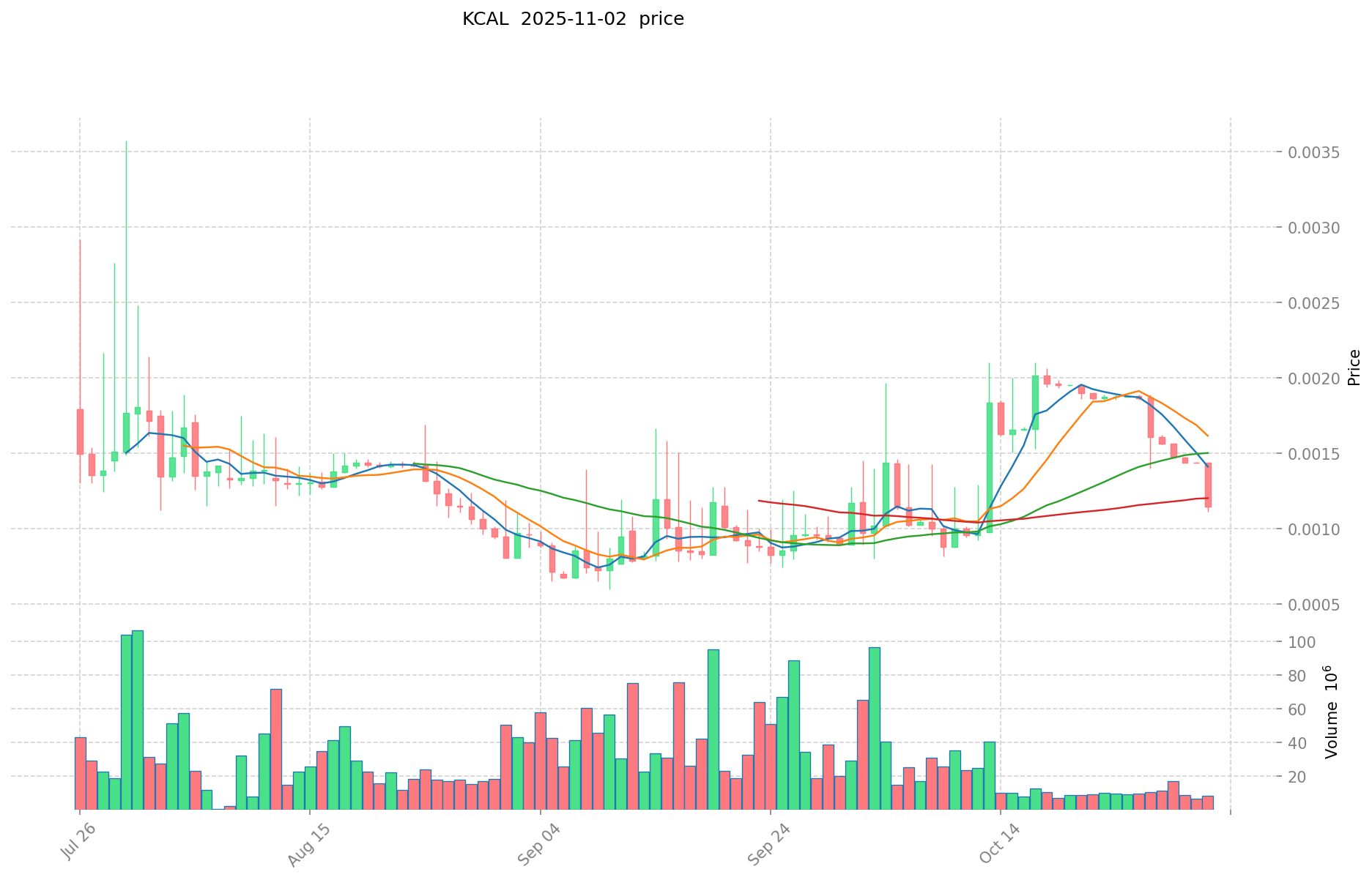What is KCAL: Understanding the Energy Measurement in Your Food
KCAL's Positioning and Significance
In 2022, the STEP app team launched KCAL (KCAL), aiming to address the lack of gamification and incentives in the fitness industry. As a key component of the "gamified metaverse for the fitness economy," KCAL plays a crucial role in the intersection of fitness, gaming, and blockchain technology.
As of 2025, KCAL has become an integral part of the move-to-earn ecosystem, supporting a user base of fitness enthusiasts and gamers. This article will analyze its technical architecture, market performance, and future potential.
Origin and Development History
Birth Background
KCAL was created by the STEP app team in 2022, intending to revolutionize the fitness industry by introducing blockchain technology and gamification elements. It emerged during the rise of move-to-earn projects and the growing interest in health-focused blockchain applications. KCAL aims to incentivize physical activity and create a more engaging fitness experience through tokenization and gamification.
Important Milestones
- 2022: Launch of the STEP app platform, introducing the concept of a fitness-focused metaverse.
- 2022: Implementation of KCAL token functionality, enabling in-app transactions and rewards.
With the support of the STEP app community and development team, KCAL continues to evolve, improving its utility within the fitness-gaming ecosystem.
How Does KCAL Work?
Decentralized Control
KCAL operates on a decentralized network, removing the need for traditional fitness industry intermediaries. This system allows users to directly benefit from their physical activities without centralized control.
Blockchain Core
KCAL utilizes blockchain technology to record fitness activities and token transactions. These records are transparent and immutable, creating a trustless environment for users to track their progress and earn rewards.
Ensuring Fairness
KCAL employs a system where users earn tokens based on their physical activities. The app uses various mechanisms to verify user activity, preventing fraudulent claims and ensuring fair distribution of rewards.
Secure Transactions
KCAL transactions are secured using cryptographic techniques:
- Private keys are used to sign transactions
- Public keys are used to verify ownership
This mechanism ensures the security of users' earned tokens and maintains transaction integrity within the STEP app ecosystem.
KCAL's Market Performance
Circulation Overview
As of November 03, 2025, KCAL's circulating supply is 50,000,000 tokens, which is equal to its total supply of 50,000,000. The maximum supply is also set at 50,000,000, indicating a fixed supply model.
Price Volatility
KCAL reached its all-time high of $5 on November 08, 2022, likely driven by market enthusiasm for fitness-related blockchain projects.
Its lowest price was $0.00062056, recorded on September 10, 2025, possibly due to broader market conditions or project-specific factors.
These fluctuations reflect market sentiment, adoption trends, and external factors affecting the fitness economy and GameFi sectors.
Click to view the current market price of KCAL

On-Chain Metrics
- Daily Transaction Volume: $11,267.77 (indicating network activity)
- Active Addresses: 152,777 (reflecting user engagement)
KCAL Ecosystem Applications and Partnerships
Core Use Cases
KCAL's ecosystem supports various applications:
- GameFi: Step.app, offering fitness-based play-to-earn gaming.
- Metaverse: Step.app, driving gamified fitness experiences in the metaverse.
Strategic Partnerships
KCAL has established partnerships with Step.app, enhancing its technological capabilities and market influence. These partnerships provide a solid foundation for KCAL's ecosystem expansion.
Controversies and Challenges
KCAL faces the following challenges:
- Market Volatility: Significant price fluctuations and market cap changes
- Competition: Emerging fitness and GameFi projects in the crypto space
- User Adoption: Attracting and retaining users in the fitness-based crypto market
These issues have sparked discussions within the community and market, driving continuous innovation for KCAL.
KCAL Community and Social Media Atmosphere
Fan Enthusiasm
KCAL's community shows vigor, with 152,777 holders as of the latest data.
On X platform, related posts and tags like #KCAL often trend, though specific metrics are not available.
Price movements and Step.app updates ignite community enthusiasm.
Social Media Sentiment
Sentiment on X appears mixed:
- Supporters praise KCAL's integration with fitness and GameFi, viewing it as a "revolutionary fitness-to-earn token".
- Critics focus on price volatility and market cap fluctuations.
Recent trends show varied sentiment depending on market conditions.
Hot Topics
X users actively discuss KCAL's role in fitness motivation, GameFi potential, and market performance, showcasing both its transformative potential and the challenges in mainstream adoption.
More Information Sources for KCAL
- Official Website: Visit Step.app official website for features, use cases, and latest updates.
- Social Media: On X platform, Step.app uses @StepApp_ handle, covering technology updates, community events, and partnership news.
KCAL Future Roadmap
- Ecosystem Goal: Expand the fitness-based GameFi ecosystem
- Long-term Vision: Become a leading token in the fitness and GameFi intersection
How to Participate in KCAL?
- Purchase Channels: Buy KCAL on Gate.com
- Storage Solutions: Use secure wallets recommended by Step.app
- Engage with Step.app: Participate in the fitness-based gaming ecosystem
- Community Involvement: Follow Step.app's social media for updates and community events
Summary
KCAL, through blockchain technology, is redefining the intersection of fitness and digital currency, offering gamified fitness experiences and play-to-earn opportunities. Its active community, integration with Step.app, and unique market position set it apart in the cryptocurrency space. Despite facing market volatility and competition, KCAL's innovative approach to fitness-based crypto and clear association with Step.app give it a distinctive place in the future of decentralized fitness technologies. Whether you're new to crypto or an experienced player, KCAL presents an interesting opportunity to explore the fusion of fitness and blockchain technology.
FAQ
Is a kcal the same as a calorie?
No, a kcal (kilocalorie) is not the same as a calorie. A kcal equals 1,000 calories.
How many kcal make 1 calorie?
1 calorie is equal to 1/1000 of a kilocalorie (kcal). So, 0.001 kcal makes 1 calorie.
What does 500 kcal mean?
500 kcal represents 500 kilocalories of energy, which is the amount of energy the body gets from consuming that amount of food.
What is 100 kcal in calories?
100 kcal is equal to 100 calories. In nutrition, kcal and calories are used interchangeably to measure energy content in food.
Share
Content